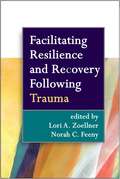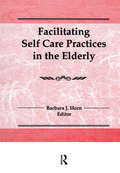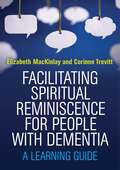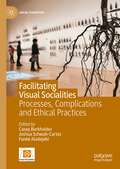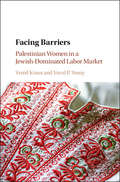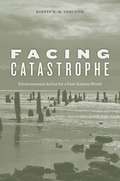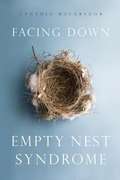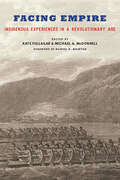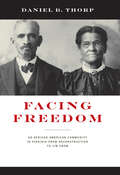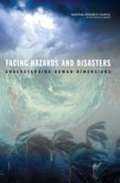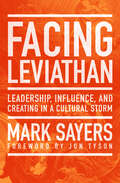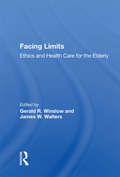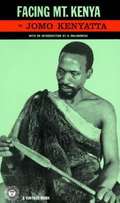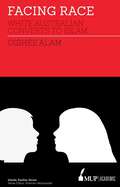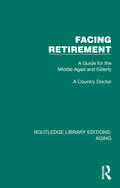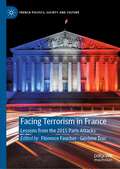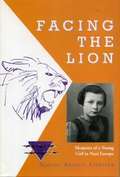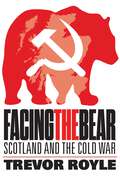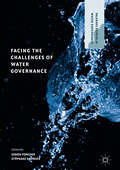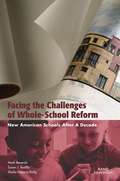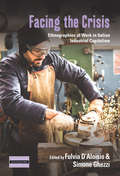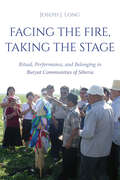- Table View
- List View
Facilitating Resilience and Recovery Following Trauma
by Lori A. Zoellner Norah C. FeenyThis volume synthesizes cutting-edge research on natural processes of resilience and recovery, highlighting implications for trauma treatment and prevention. Prominent experts examine what enables many trauma survivors to heal over time without intervention, as well what causes others to develop long-term psychiatric problems. Identifying key, modifiable risk and resilience factors--such as cognitions and beliefs, avoidance, pain, and social support--the book provides recommendations for when (and when not) to intervene to promote recovery. Illustrative case examples are included. A section on specific populations discusses children, military personnel, and low socioeconomic status or marginalized communities.
Facilitating Self Care Practices in the Elderly
by Barbara J HornThis book is a synthesis of current knowledge from published sources and expert consultants relating to three commonly occurring problems in home health care practice--self-administration of medications, family caregiving issues, and teaching the elderly. For each problem addressed, assessment guides and interventions are outlined, making this book an invaluable resource for professionals, researchers, and agencies concerned with providing top-quality care for the elderly. Home health care agencies can use the guide for orientation of new staff and inservice education for current staff. Home health care staff can use many of the assessment guides and resource lists in their work with clients. Facilitating Self Care Practices in the Elderly can also serve as a basis for standard development. Researchers interested in these clinical problems will find that the literature review and synthesis will facilitate the development of the theoretical underpinning for their research. Educators will find the book helpful in courses and as a basis for curriculum development. First Published in 1990. Routledge is an imprint of Taylor & Francis, an informa company.
Facilitating Spiritual Reminiscence for People with Dementia: A Learning Guide
by Elizabeth Mackinlay Corinne TrevittSpiritual reminiscence is a way of communicating that acknowledges the person as a spiritual being and seeks to engage the person in a more meaningful and personal way. This practical guide teaches carers how to facilitate engaging and stimulating spiritual reminiscence sessions with older people, and particularly with people with dementia. After reading the guide, carers will understand the many and varied benefits of spiritual reminiscence, and will have developed the skills, confidence and communication techniques needed to support people with dementia in this activity. The authors present in accessible terms the evidence-base to support the benefits of the approach and provide clear, step-by-step instructions for facilitating spiritual reminiscence sessions, including useful suggestions for ideas and questions to stimulate discussion. Intended to be used either as a self-learning tool or as the basis for staff training sessions, this will be a valuable resource for staff in care homes and day centres, activity coordinators, pastoral and spiritual care professionals, clergy and spiritual leaders.
Facilitating Visual Socialities: Processes, Complications and Ethical Practices (Social Visualities)
by Casey Burkholder Joshua Schwab-Cartas Funké AladejebiThis edited collection seeks to enrich the dialogue about the expansive possibilities of visual sociological research facilitation. Although facilitating ethical research has long been identified within medical research literatures, there is a dearth of distinct perspectives and voices in academic theorizing when it comes to facilitating ethical research. For example, how can researchers learn and incorporate community created approaches to facilitation into their visual research approaches? Although ethics, positionality, and reflexivity remain important components of visual research, the authors argue that the incremental decisions made in real time by research facilitators within the process of visual research is currently under-theorized. This edited collection seeks to discuss how thinking about facilitation in a more critical and nuanced manner, as well as thinking through the kinds of relations, problems and local changes that happen within a project, can help visual sociological researchers move towards more equitable research practices.
Facing Barriers: Palestinian Women in a Jewish-Dominated Labor Market
by Vered Kraus Yuval YonayPalestinian women have slowly become active in the formal labor market in Israel. In this book, Vered Kraus and Yuval Yonay describe and analyse the labor experience of these Palestinian women, and explain why Palestinian and Jewish women have different rates and outcomes in the labor market. <P><P>Challenging popular views that ascribe these differences to Arab culture and Islam, they instead find that it is state policies and widespread discrimination that hinder Palestinian women's participation and success. By including the various Palestinian sub-groups - Muslims, Bedouins, Druze, Christians, non-citizen residents of Jerusalem - this book shows how the specific life circumstances of the women from these subgroups affect their employment and achievements. The book thus enriches the acute discussion on the labour market experiences of Muslim and Arab women in the Middle East and North Africa and in advanced industrialized societies.
Facing Catastrophe: Environmental Action for a Post-Katrina World
by Robert R. VerchickAs Hurricane Katrina vividly revealed, disaster policy in the United States is broken and needs reform. What can we learn from past disasters—storms, floods, earthquakes, tsunamis, landslides, and wildfires—about preparing for and responding to future catastrophes? How can these lessons be applied in a future threatened by climate change? In this bold contribution to environmental law, Robert Verchick argues for a new perspective on disaster law that is based on the principles of environmental protection. His prescription boils down to three simple commands: Go Green, Be Fair, and Keep Safe. “Going green” means minimizing exposure to hazards by preserving natural buffers and integrating those buffers into artificial systems like levees or seawalls. “Being fair” means looking after public health, safety, and the environment without increasing personal and social vulnerabilities. “Keeping safe” means a more cautionary approach when confronting disaster risks. Verchick argues that government must assume a stronger regulatory role in managing natural infrastructure, distributional fairness, and public risk. He proposes changes to the federal statutes governing environmental impact assessments, wetlands development, air emissions, and flood control, among others. Making a strong case for more transparent governmental decision-making, Verchick offers a new vision of disaster law for the next generation.
Facing Down Empty Nest Syndrome
by Cynthia Macgregor"Remember when you initially learned you were pregnant with your firstborn (or possibly your only child)? Even then your life began to change. Before your child made his or her debut into the world, your life already began to be altered--maybe even radically altered. . . . For the next eighteen years, at minimum, a good chunk of your life was centered around your child. . . . For those eighteen or more years, you devoted a lot of your life--not just your time but your energies, your concerns, your thoughts, and your activities--to that child or those children. . . . And now they're gone, or close to moving out, and your life has a big void in it, a hole that you're not sure how to fill." In her book Facing Down Empty Nest Syndrome, Cynthia MacGregor helps all parents begin to cope with their children moving out and on with their lives. She gives practical advice on what to do before, during, and after children leave the home. She gives tips on how to stay connected without being overbearing as well as what to do with all of the extra time without kids at home.
Facing Empire: Indigenous Experiences in a Revolutionary Age
by Kate Fullagar and Michael A. McDonnellA comprehensive volume that interrogates European imperialism from the perspective of indigenous experiences.The contributors to Facing Empire reimagine the Age of Revolution from the perspective of indigenous peoples. Rather than treating indigenous peoples as distant and passive players in the political struggles of the time, this book argues that they helped create and exploit the volatility that marked an era while playing a central role in the profound acceleration in encounters and contacts between peoples around the world. Focusing in particular on indigenous peoples’ experiences of the British Empire, this volume takes a unique comparative approach in thinking about how indigenous peoples shaped, influenced, redirected, ignored, and sometimes even forced the course of modern imperialism. The essays demonstrate how indigenous-shaped local exchanges, cultural relations, and warfare provoked discussion and policymaking in London as much as it did in Charleston, Cape Town, or Sydney. Facing Empire charts a fresh way forward for historians of empire, indigenous studies, and the Age of Revolution and shows why scholars can no longer continue to exclude indigenous peoples from histories of the modern world. These past conflicts over land and water, labor and resources, and hearts and minds have left a living legacy of contested relations that continue to resonate in contemporary politics and societies today. Covering the Indian and Pacific Oceans, Australia, and West and South Africa, as well as North America, this book looks at the often misrepresented and underrepresented complexity of the indigenous experience on a global scale.Contributors: Tony Ballantyne, Justin Brooks, Colin G. Calloway, Kate Fullagar, Bill Gammage, Robert Kenny, Shino Konishi, Elspeth Martini, Michael A. McDonnell, Jennifer Newell, Joshua L. Reid, Daniel K. Richter, Rebecca Shumway, Sujit Sivasundaram, Nicole Ulrich
Facing Eugenics
by Erika DyckFacing Eugenics is a social history of sexual sterilization operations in twentieth-century Canada. Looking at real-life experiences of men and women who, either coercively or voluntarily, participated in the largest legal eugenics program in Canada, it considers the impact of successive legal policies and medical practices on shaping our understanding of contemporary reproductive rights. The book also provides deep insights into the broader implications of medical experimentation, institutionalization, and health care in North America.Erika Dyck uses a range of historical evidence, including medical files, court testimony, and personal records to place mental health and intelligence at the centre of discussions regarding reproductive fitness. Examining acts of resistance alongside heavy-handed decisions to sterilize people considered "unfit," Facing Eugenics illuminates how reproductive rights fit into a broader discussion of what constitutes civil liberties, modern feminism, and contemporary psychiatric survivor and disability activism.
Facing Freedom: An African American Community in Virginia from Reconstruction to Jim Crow (The American South Series)
by Daniel B. ThorpThe history of African Americans in southern Appalachia after the Civil War has largely escaped the attention of scholars of both African Americans and the region. In Facing Freedom, Daniel Thorp relates the complex experience of an African American community in southern Appalachia as it negotiated a radically new world in the four decades following the Civil War. Drawing on extensive research in private collections as well as local, state, and federal records, Thorp narrates in intimate detail the experiences of black Appalachians as they struggled to establish autonomous families, improve their economic standing, operate black schools within a white-controlled school system, form independent black churches, and exercise expanded—if contested—roles as citizens and members of the body politic. Black out-migration increased markedly near the close of the nineteenth century, but the generation that transitioned from slavery to freedom in Montgomery County established the community institutions that would survive disenfranchisement and Jim Crow. Facing Freedom reveals the stories and strategies of those who pioneered these resilient bulwarks against the rising tide of racism.
Facing Hazards And Disasters: Understanding Human Dimensions
by Opportunities Committee on Disaster Research in the Social Sciences: Future ChallengesSocial science research conducted since the late 1970s has contributed greatly to society&#39s ability to mitigate and adapt to natural, technological, and willful disasters. However, as evidenced by Hurricane Katrina, the Indian Ocean tsunami, the September 11, 2001 terrorist attacks on the United States, and other recent events, hazards and disaster research and its application could be improved greatly. In particular, more studies should be pursued that compare how the characteristics of different types of events&#8212including predictability, forewarning, magnitude, and duration of impact&#8212affect societal vulnerability and response. This book includes more than thirty recommendations for the hazards and disaster community.
Facing Leviathan: Leadership, Influence, and Creating in a Cultural Storm
by Mark SayersThere are two styles of leadership at war in the world.On one side the mechanical leader casts a vision of heroic action aided by pragmatism, reason, technology, and power.On the other side the organic leader strives to bring forth creativity, defying convention, and relishing life in culture&’s margins.This leadership battle is at the heart of our contemporary culture, but it is also an ancient battle. It is the reinvocation of two great heresies, one rooted in an attempt to reach for godlikeness, the other bowing before the sea monster of the chaotic deep.Today&’s leader must answer many challenging questions including:What does it mean to lead in a cultural storm?How do I battle the darkness in my own heart?Is there such a thing as a perfect leader?Weaving a history of leadership through the Enlightenment, Romanticism, tumultuous 19th-century Paris, and eventually World War II, cultural commentator Mark Sayers brings history and theology together to warn of the dangers yet to come, calling us to choose a better way.
Facing Leviathan: Leadership, Influence, and Creating in a Cultural Storm
by Mark SayersThere are two styles of leadership at war in the world.On one side the mechanical leader casts a vision of heroic action aided by pragmatism, reason, technology, and power.On the other side the organic leader strives to bring forth creativity, defying convention, and relishing life in culture&’s margins.This leadership battle is at the heart of our contemporary culture, but it is also an ancient battle. It is the reinvocation of two great heresies, one rooted in an attempt to reach for godlikeness, the other bowing before the sea monster of the chaotic deep.Today&’s leader must answer many challenging questions including:What does it mean to lead in a cultural storm?How do I battle the darkness in my own heart?Is there such a thing as a perfect leader?Weaving a history of leadership through the Enlightenment, Romanticism, tumultuous 19th-century Paris, and eventually World War II, cultural commentator Mark Sayers brings history and theology together to warn of the dangers yet to come, calling us to choose a better way.
Facing Limits: Ethics And Health Care For The Elderly
by Gerald R. Winslow James W. WaltersAdvances in medical technology and the rapidly increasing population of older Americans are causing people to question the ethical limits of life-extending interventions. How do we weigh issues involving equity, efficiency, autonomy, natural life span, and responsibility for the financial burdens of health care for the elderly? In this collection o
Facing Mount Kenya
by Jomo KenyattaWith an Introduction by Bronislav Malinkowski, Facing Mount Kenya is a central document of the highest distinction in anthropological literature, an invaluable key to the structure of African society and the nature of the African mind. Facing Mount Kenya is not only a formal study of life and death, work and play, sex and the family in one of the greatest tribes of contemporary Africa, but a work of considerable literary merit. The very sight and sound of Kikuyu tribal life presented here are at once comprehensive and intimate, and as precise as they are compassionate.
Facing Race: White Australian Converts to Islam
by Oishee AlamThe figure of 'the Muslim' is constructed by both Muslim and non-Muslim Australians as incongruent with whiteness, but what of white Muslim converts, who are at once highly racialised and racially invisible? Facing Race explores the lived experiences of thirty-six Australian converts to Islam, in a nation where Islam is cast in opposition to the dominant racial narrative of whiteness that informs the nation's core ideology. Drawing on in-depth interviews, author Oishee Alam provides a fascinating account of how racialisation is reproduced in everyday interpersonal encounters by white converts, with Muslims and non-Muslims alike - and what those experiences reveal to us about race, Islamophobia and whiteness in contemporary Australia. Islamic Studies Series - Volume 26
Facing Retirement: A Guide for the Middle Aged and Elderly (Routledge Library Editions: Aging)
by A Country DoctorOriginally published in 1960 and revised in 1964 the blurb for Facing Retirement read:“Mature men and women are not afraid of advancing years. More and more seek to prepare themselves for retirement so that they may then find all the happiness they can.This phase of life is interesting to a widening circle, and in writing this book it was the author’s aim to discuss readably, simply, and from his experience with his patients, most relevant aspects of these later years. It was a pioneer in its approach: any similar books which may follow, if they help to lessen the burden of the elderly and aged which has to be sustained by the younger generations, must be of the highest importance not only to individuals but to the nation.For nearly thirty years the author of this book has had the medical care of over 2,000 people of all ages in a cluster of villages and hamlets at the foot of the Cotswold Hills. He has been chairman or president of the County Association for the Care of old People since its inception in 1952.”Today it can be read and enjoyed in its historical context.
Facing Terrorism in France: Lessons from the 2015 Paris Attacks (French Politics, Society and Culture)
by Gérôme Truc Florence FaucherFrom 2015, Europe was hit by a new wave of terrorist attacks, coordinated or supported by an international Islamist organization (ISIS) but sometimes also perpetrated by citizens of the targeted country: the attacks on Paris, Brussels, London, Manchester, Nice and Barcelona probably attracted most attention but the most dramatic were perpetrated in Paris, in January and November 2015. These events shook the foundations of French society not only because of their magnitude but also because of the symbolic nature of the targets. Whilst in January, the targets were carefully selected as emblematic of France (the satirical weekly Charlie Hebdo, the police forces, the Jewish community) and of European liberal values (journalists and cartoonists), in November the victims ordinary people enjoying music, sports and restaurants. The book offers a unique interdisciplinary investigation into the complex responses of French society: from the individual level (survivors of the Bataclan attack, emotional citizens paying homage to the victims, French Muslims) to the meso level of civic association and web communities, and the macro level of the State and public opinion.
Facing The Lion: Memoirs of a Young Girl in Nazi Europe
by Simone Arnold LiebsterFacing the Lion is the autobiographical account of a young girl's faith and courage. In the years immediately preceding World War II, Simone Arnold is a young girl who delights in life--her doting parents, her loving aunts and uncles, and her grandparents at their mountain farm in the Alsace-Lorraine region of France. As Simone grows into her preteen years, her parents turn from the Catholic Church and become devout Jehovah's Witnesses. Simone, too, embraces the faith. The Nazi party (the "Lion") takes over Alsace-Lorraine, and Simone's schools become Nazi propaganda machines. Simone refuses to accept the Nazi party as being above God. Her simple acts of defiance lead her to be persecuted by the school staff and local officials, and ignored by friends. With her father already taken away to a German concentration camp, Simone is wrested away from her mother and sent to a reform school to be "reeducated." There, Simone learns that her mother has also been put in a camp. Simone remains in the harsh reform school until the end of the war. She emerges feeling detached from life, but the faith that sustains her through her ordeals helps her rebuild her world. Facing the Lion provides an interesting and detailed view of ordinary country and town life in the pre-war years and during Hitler's regime. This inspiring story of a young girl standing up for her beliefs in the face of society's overwhelming pressure to conform is a potent reminder of the power of remaining true to one's beliefs. "...a shining example for the power of the spirit to triumph over evil....an eloquent firsthand account of a little girl's struggle to keep her faith in a world which had gone mad." --Ernst Rodin, author, War & Mayhem: Reflections of a Viennese Physician
Facing the Bear: Scotland and the Cold War
by Trevor RoyleThe author of Culloden explores Scotland&’s history during the Cold War. Between the end of the Second World War and the collapse of Communism, confrontation with the Soviet Union was an everyday reality. As part of NATO&’s response, Scotland played a key role in the alliance&’s forward maritime defense strategy, aimed at containing the Soviet threat from naval and air forces. During this period, 10 percent of the UK&’s naval and air forces were based in Scotland, and there was a substantial U.S. presence, as well as top secret satellite and command stations. In Facing the Bear, Trevor Royle paints a fascinating portrait of this extraordinary period, examining not just the wider military and political contexts, but also showing how the defense industry brought huge economic benefits, how CND maintained a high-profile presence, and how anti-nuclear sentiments underpinned much of the left&’s thinking in Scotland and contributed to the hegemony enjoyed by the Labour Party in Scotland during the Cold War.Praise for Facing the Bear&“Engrossing . . . . Like a military commander at the top of his game, Royle marshals his material to maximum effect to show how Scotland has been shaped by, and also helped shape, the Cold War . . . . He ranges far and wide and has that rare talent to marry the local with the geopolitical . . . . But this is not simply a story of military hardware and confrontation. Royle is very interesting on how the Cold War influenced our cultural life from the novel to poetry and the protest song.&” —Barclay McBain, The Herald (UK)
Facing the Challenges of Water Governance (Palgrave Studies in Water Governance: Policy and Practice)
by Stéphane Saussier Simon PorcherAccess to water is one of the most pressing global issues of the twenty-first century, particularly when set against the background of a rapidly growing global population. This book provides a cutting-edge, comprehensive overview of the challenges facing water governance and regulatory choices. The recently adopted Sustainable Development Goals set forward an ambitious agenda of providing universal access to good quality water supply and sanitation services within a financially constrained environment: however, the various peculiarities of each country regarding water governance makes it difficult to identify and implement the best practices and benchmarks. Drawing together empirical studies from countries around the world, the editors and contributors combine extensive data to review the individual challenges facing each country, from the supervision of autonomous regulatory bodies to the question of centralization and the influence of local utility companies. This pioneering and practical volume will be of interest and value not only to students and scholars of water governance, but also to practitioners and regulators.
Facing the Challenges of Whole-School Reform
by Susan J. Bodilly Sheila Nataraj Kirby Mark BerendsAbout a decade ago, New American Schools (NAS) set out to address theperceived lagging performance of American students and the lacklusterresults of school reform efforts. As a private nonprofit organization,NAS's mission was-and is-to help schools and districts raise studentachievement levels by using whole-school designs and design team assistanceduring implementation. Since its inception, NAS has engaged in adevelopment phase (1992-1993), a demonstration phase (1993-1995), and ascale-up phase (1995-present). Over the last ten years, RAND has been monitoring the progress of the NASinitiative. This book is a retrospective on NAS and draws together thefindings from RAND research. The book underscores the significantcontributions made by NAS to comprehensive school reform but also highlightsthe challenges of trying to reform schools through whole-school designs.Divided into sections on each research phase, the book concludes with anafterword by NAS updating its own strategy for the future. This book willinterest those who want to better understand comprehensive school reform andits effects on teaching and learning within high-stakes accountabilityenvironments.
Facing the Crisis: Ethnographies of Work in Italian Industrial Capitalism (Dislocations #30)
by Fulvia D’Aloisio and Simone GhezziAmong the founding nations of the European Union, no nation has experienced a more devastating affect from the 2008 economic crisis than Italy. Although its recovery has recently begun, Italy has fallen even further behind EU economic leaders and the EU average. Looking at how and why this happened, Facing the Crisis brings together ethnographic material from anthropological research projects carried out in various Italian industrial locations. With its wide breadth of locations and industries, the volume looks at all corners of the diverse Italian manufacturing system.
Facing the Death Penalty: Essays on a Cruel and Unusual Punishment
by Michael L. RadeletEssays generally opposed to the practice.
Facing the Fire, Taking the Stage: Ritual, Performance, and Belonging in Buryat Communities of Siberia
by Joseph J. LongIn the mid-2000s, the Russian government began to merge Siberia's smallest Indigenous territories into larger administrative regions. Among Buryat Mongols living to the west of Lake Baikal the state promoted a policy of "National Cultural Autonomy," which sought to separate culture from territory amid this consolidation of land and people. Although public performances of Buryat culture were mobilized to show support for the policy, Joseph Long's compelling ethnography provides alternative ways to understand the meanings attached to these displays. At the same time, the book documents how resurgent local rituals demonstrated enduring ties to the land. Drawing on classic theories of ritual and performance, Facing the Fire, Taking the Stage explores how Buryat shamanism and state-sanctioned performing arts have allowed Buryats to negotiate and express different kinds of belonging to people and land. Based on several years of anthropological fieldwork in Western Buryat communities, this book provides new insights into the ways that these forms have influenced one another over time.While Buryat experience has been fundamentally shaped by Soviet communism and its aftermath, Facing the Fire, Taking the Stage shows how this history parallels the experience of Indigenous peoples worldwide.
